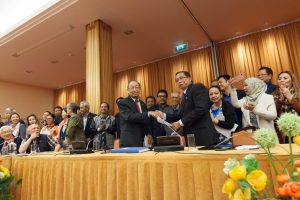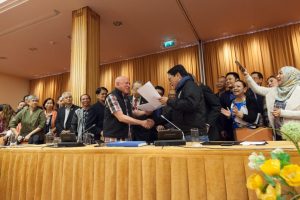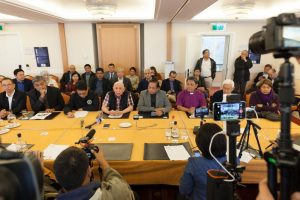Sison to come home in connection with peace process or his nomination as National Artist for Literature
NDFP Media Office
Press release
7 April 2017
 National Democratic Front of the Philippines (NDFP) chief political consultant Jose Maria Sison said he is open to going home to the Philippines, when there is a highly significant development in the GRP-NDFP peace negotiations, such as the amnesty and release of all political prisoners listed by the NDFP and the signing of the Comprehensive Agreement on Social and Economic Reforms by the GRP and NDFP negotiating panels in Oslo.
National Democratic Front of the Philippines (NDFP) chief political consultant Jose Maria Sison said he is open to going home to the Philippines, when there is a highly significant development in the GRP-NDFP peace negotiations, such as the amnesty and release of all political prisoners listed by the NDFP and the signing of the Comprehensive Agreement on Social and Economic Reforms by the GRP and NDFP negotiating panels in Oslo.
He also said that one more possibility for his homecoming soon could be the result of his nomination as National Artist for Literature (Poetry and Essay). He had just learned that creative writers, performing artists and mass leaders, including a group from the Concerned Artists of the Philippines are nominating him for the National Artist Award. He welcomed the nomination, saying this could also be a “compelling reason” for him to come home. But he modestly said that at this moment, he could not presume to win the award.
Sison brushed off rumors that he is “very sick.” He said he is, in fact, already at the stage of gaining strength after three weeks of thoroughgoing diagnostics and medical treatment and one more week of recuperation in the hospital.
Unlike in the third round held in Rome last January, where Sison skipped the closing ceremonies, he was at every major event of the fourth round this April, including a reception at the residence of the Norwegian ambassador to The Netherlands.
Should a “real milestone of great substance for the Filipino people be achieved in the peace negotiations,” Sison said he would consider visiting the Philippines to join celebrations of the event and touch base with the masses. He said in his opening and closing remarks for the fourth round that he is optimistic that the CASER would be signed within 2017.
Sison is an outstanding poet and essayist, with more than 25 books to his credit. He belongs to the patriotic and revolutionary tradition of Jose Rizal, Andres Bonifacio, Francisco Balagtas, Lope K. Santos, Amado V. Hernandez and other literary giants of their time. He has contributed greatly to the Filipino sense of nationhood, advocating national sovereignty and independence, democracy, social justice, economic development through land reform and national industrialization, patriotic culture and solidarity with all peoples for peace and development.
He won the Southeast Asia WRITE Award for poetry and the essay in 1986. The award is the highest of its kind in Southeast Asia and is sponsored by the royal family of Thailand. When still the crown prince, the present Thai king handed him the award in a grand ceremony in Bangkok.
His writings have wide influence in the Philippines among his literary peers, the generations of youth since 1959 and in the mass movement for national and social liberation. The works of Sison have also been published abroad by major publishers. He enjoys worldwide recognition as a Filipino patriot and creative writer.
The National Artists are proclaimed by the President, after choosing them from a short list of nominees provided by the Cultural Center of the Philippines (CCP) and the National Commission for Culture and the Arts (NCCA). Creative writers, performing artists and mass leaders are now urging the CCP and NCAA to announce the guidelines and forms for nomination within April. The awards are given every three years and are due within 2017.###

 The National Democratic Front of the Philippines (NDFP) and the Government of the Republic of the Philippines (GRP) today agreed to work together to forge an interim joint ceasefire agreement. They formalized their commitment through a document entitled Agreement on an Interim Joint Ceasefire which was signed this afternoon by NDFP panel chair Fidel Agcaoili and GRP panel chair Silvestre Bello III.
The National Democratic Front of the Philippines (NDFP) and the Government of the Republic of the Philippines (GRP) today agreed to work together to forge an interim joint ceasefire agreement. They formalized their commitment through a document entitled Agreement on an Interim Joint Ceasefire which was signed this afternoon by NDFP panel chair Fidel Agcaoili and GRP panel chair Silvestre Bello III. The National Democratic Front of the Philippines (NDFP) signed an agreement on an interim joint ceasefire in order to ensure that negotiations with the Government of the Republic of the Philippines (GRP) on basic socio-economic and political reforms move forward.
The National Democratic Front of the Philippines (NDFP) signed an agreement on an interim joint ceasefire in order to ensure that negotiations with the Government of the Republic of the Philippines (GRP) on basic socio-economic and political reforms move forward. The National Democratic Front of the Philippines (NDFP) today reiterates and confirms the February 19, 2017 statement of the Communist Party of the Philippines (CPP) directing the concerned New People’s Army (NPA) units to expedite the release of the six (6) captured prisoners of war (POWs) still in their custody as a “positive gesture” for the ongoing fourth round of the GRP-NDFP peace talks.
The National Democratic Front of the Philippines (NDFP) today reiterates and confirms the February 19, 2017 statement of the Communist Party of the Philippines (CPP) directing the concerned New People’s Army (NPA) units to expedite the release of the six (6) captured prisoners of war (POWs) still in their custody as a “positive gesture” for the ongoing fourth round of the GRP-NDFP peace talks.